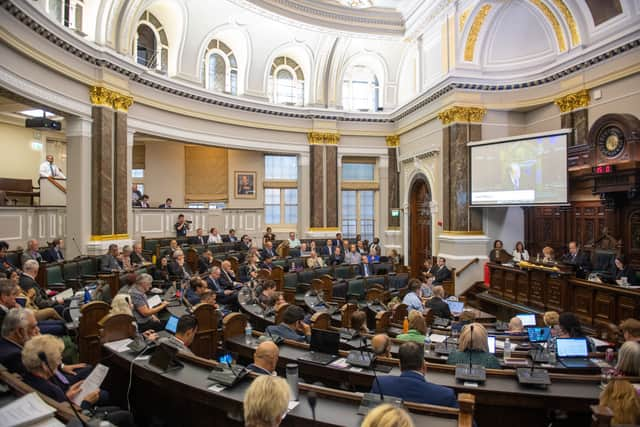Birmingham City Council’s seven-point ‘bankruptcy’ recovery plan - including Council Tax
and live on Freeview channel 276
Birmingham City Council’s under-fire CEO has issued a seven-point recovery plan in a last-ditch attempt to save the city from financial ruin.
The country’s largest unitary authority remains in a state of emergency, with no-nonsense commissioner Max Caller appointed by the government to help tackle £1 billion-worth of financial shortfalls.
Advertisement
Hide AdAdvertisement
Hide AdThey include the equal pay liability bill, a figure between £650m and £760m, an in-year budget gap of £87m for 2023/24 while, in 2024/25, that figure will rise to more than £165m. There’s also the £100m bill to fix the council’s IT system Oracle which, according to the council’s most senior finance officer, Fiona Greenway, “will make things more difficult than they should be”.
The council’s leader John Cotton has admitted that the authority is “at a crossroads”. He said: “It’s been an incredibly tough month and I apologise that we’re faced with such stark choices. These are worrying times and I’m sorry for that.”
The council’s chief executive, Deborah Cadman, continues to face fierce criticism for the handling of the local authority, with some calling on her to step down.
However, in a bid to drag Birmingham City Council back onto its feet, Ms Cadman has issued a framework intended on solving the city’s financial woes. At a finance meeting held on Friday (September 29), Ms Cadman outlined the seven steps to recovery:
1. Reduce spending
Advertisement
Hide AdAdvertisement
Hide Ad“The first element of the financial recovery plan is to reduce spending and to mitigate spending for 2023/24. We are working at a fast rate of knots to deliver the immediate in-year budget pressures and the savings we need to make,” she said. We’re very focused on the need to deliver a balanced budget for 2023/24 in February of next year. There’s also a revised emergency budget for 2023/24 that will be presented at a further extraordinary meeting of the full council at a date in late October.”
2. Restructure
“The second element of the plan is an organisational redesign that will take place next year once we are clear about the financial implications of our budget,” Ms Cadman continued. “I know many people are anxious about this. We’re looking at developing leaner corporate services. We’ll look at leaner service structures and that will essentially be to cut out duplication. There’s lots of duplication across the organisation where we need to be a lot smarter at cutting out.
“There also needs to be greater clarity of our service offers to citizens across the board. Our first priority has to be about reassuring citizens but, in addition to that, be very focused on what we can deliver for our citizens as well.
“We need to be more effective in looking at early intervention and prevention to reduce demand and cut costs of failure. I am still of the view that this council needs to be better at prevention and intervening early in the challenges people face. I don’t know anybody that would disagree with that.


Advertisement
Hide AdAdvertisement
Hide Ad“We need more effective partnerships with other public, private and community sector organisations because, again, we are now in conversation with some of our partners who are offering to take on some of the responsibility to deliver services. In some cases, some of the community groups that we are working with are better placed to deliver some of the services that we are delivering at the moment. We’re increasing our partnerships and engagement with those.
“We also need to be clear about the services that are considered statutory and the spending which is considered essential. We’re looking at the spending controls and applying a framework.
“It would also be remiss of me not to suggest to this council that, as a result of this, the council will be different and the make-up of the council will be different.”
3. Asset review
Ms Cadman then spoke of asset reviews, saying: “The third part of the plan is capital strategy and asset review to raise funds and minimise costs. We’re reviewing all of our capital expenditure and programmes. We’re looking at which of those programmes can be paused and which should continue.
Advertisement
Hide AdAdvertisement
Hide Ad“We’re looking at borrowing costs and looking at assets because, before we can approach the government and get an agreement for additional financial support, we will need to demonstrate that we’ve done everything we possibly can to minimise any borrowing costs we are seeking. So assets, sale of assets or the review of assets leading to a disposal programme is being undertaken at the moment and will be really important.
“We’re spending just as much time looking at those assets which this organisation needs to keep. And the reason why they need to keep them is because they make a direct impact on our ability to grow the economy of this city. There will be strategic decisions to be made when we approach the government so we don’t fall into the trap of simply selling everything without doing the necessary assessment about the real value of those assets.”
4. Review of council-controlled companies and trading services
She then highlighted another point in the ‘bankruptcy’ recover plan saying: “The fourth area is to review council-controlled companies and trading services,” Ms Cadman told council members.


5. Income review - including Council Tax
Advertisement
Hide AdAdvertisement
Hide AdIn the fifth area she touched on Council Tax saying: “The next element is income review and it’s something that will be sensitive and contentious. It is something that we will need to be very thoughtful about.
“The main sources of income are business rates, council tax and other income which include fees and charges. This will need to be done very carefully and thoughtfully at lockstep with councillors. We need to consider a wide range of options to balance income and expenditure over the period of the mid-term financial plan, not just this financial year.”
6. Funding equal pay liability
Ms Cadman continued: “[The sixth element is] limitation and funding of equal pay liability. That will continue to be an important element of our financial recovery plan.”
7. Extra financial support
“And finally, the requirement for extra financial support which is highly unlikely to be a grant from the government but it will be permission to capitalise revenue liabilities and borrow and repay over time. It’s important we minimise the borrowing cost as much as possible,” she concluded.
Comment Guidelines
National World encourages reader discussion on our stories. User feedback, insights and back-and-forth exchanges add a rich layer of context to reporting. Please review our Community Guidelines before commenting.